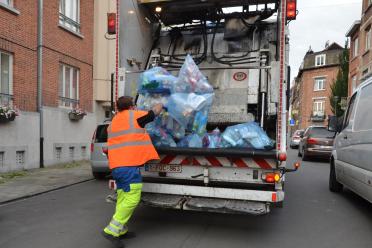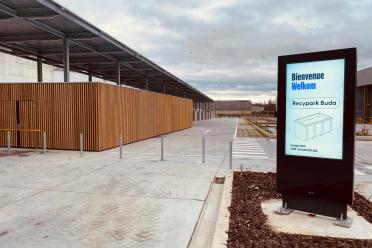
Optimising food and garden waste collections
Why do I still have to separate my food waste from my garden waste, in two separate bags, if they are collected together?
Despite these mixed collections, Bruxelles-Propretée insists that Brussels residents should continue to distinguish between green and orange bags. Mixing garden waste and food waste in the same bag would be detrimental for several reasons:
- Bruxelles-Propreté cannot set its operations in stone and must ensure that it retains a certain degree of flexibility in designating the best collection scheme according to the volume of garden and food waste produced, which varies greatly according to the season.
- While garden waste in the green bag can be "composted" and "biomethanised", this is not the case for food waste in the orange bag, for which only biomethanation is possible. Bruxelles-Propreté must be able to direct garden waste to the composting centre or the biomethanation centre, depending on available capacity.
- Bruxelles-Propreté must ensure that a balanced percentage of garden waste and food waste is sent to the biomethanation centre. Food waste mixed with garden waste in the same bag would deprive Bruxelles-Propreté of this operational arbitration carried out upstream of collection and delivery to the biomethanation centre.
What happens to my green and orange bags if they are collected in the same lorry?
The waste is collected together in the same lorry before being taken to a biomethanation centre, where it is processed in the same way as when food waste arrives in a single stream. The valorisation, which produces compost and biogas, is identical, so mixing the waste in no way alters the environmental benefits. Did you know that 20 tonnes of food waste is enough to supply a family with electricity for a year? The residual material is used to produce compost, which is used as a natural fertiliser for agriculture.
Where can I find my updated bag release calendar indicating when to put out the bags?
Your calendar is available on our website: https://www.arp-gan.be/en/calendar-rubbish-bags
Will the switch to mixed collection have an impact on my green and orange bag collection times?
In the vast majority of cases, your hours to put out your bags will remain unchanged. For some roads, and in some municipalities, the schedule to put out your bags may be shifted by a few hours.
What criteria were used to decide on the optimisation?
One of the first criteria taken into account is the amount of waste produced. Some municipalities and/or areas with a low level of greening do not produce enough garden waste. For the 11 municipalities that switch to mixed collections, which include more green municipalities, operational and organisational choices have also dictated these changes. Lastly, for the municipalities and/or areas that remain with separate collections, it was mainly the large amount of garden waste produced that guided this decision.
Which municipalities are affected by the switch to mixed collection?
- Municipalities/areas that were already collected in mixed mode and remain so: Saint-Gilles, Pentagone, Saint-Josse and Koekelberg.
- Municipalities/areas affected by the switch to mixed use: Berchem, Ganshoren, Jette, Etterbeek, Auderghem, Forest, Laeken, Ixelles, Haren, Evere and Molenbeek.
- Municipalities that will be collecting mixed waste in certain areas and garden waste and food waste separately in other areas: Anderlecht and Schaerbeek.
Which municipalities/areas have separate collections for garden waste and food waste?
Boitsfort, Woluwe-Saint-Pierre, Woluwe-Saint-Lambert, NOH, Uccle
Why switch to mixed collection? What are the benefits?
In order to improve its services to the public and its operational processes, but also to reduce its carbon footprint, the Agency has carried out a series of optimisations of its rounds for food waste (orange bags) and garden waste (green bags).
The main impact of these changes for a majority of Brussels residents is that garden waste and food waste will be collected at the same time in 11 municipalities from 15 July.
In some neighbourhoods with little "greening" and where garden waste production is particularly low, the practice already existed. It consists of collecting orange bags at the same time as green bags during "mixed collections".
The waste is therefore collected together in the same lorry before being taken to a biomethanation centre, where it is processed in the same way as when food waste arrives in a single stream. The valorisation, which produces compost and biogas, is identical, so mixing the waste in no way alters the environmental benefits.
The aim of these optimisations, prepared by Bruxelles-Propreté over recent weeks, is to reduce the impact of its collection lorries on traffic: to ensure that the lorries have the best possible occupancy rates, while covering the fewest possible kilometres per tonne collected.


